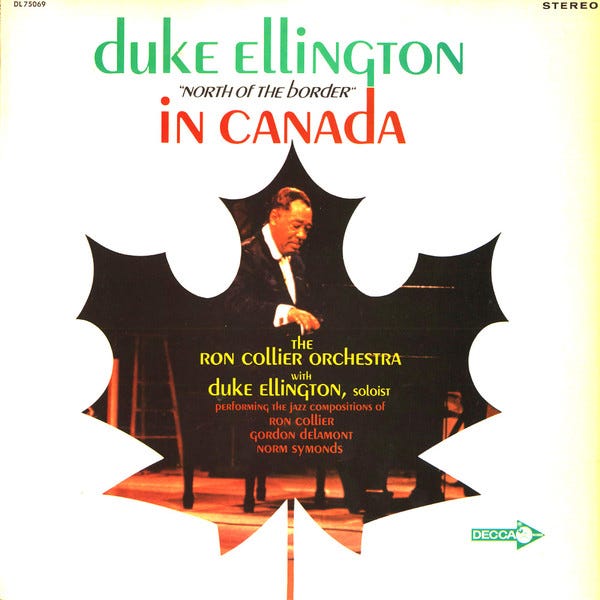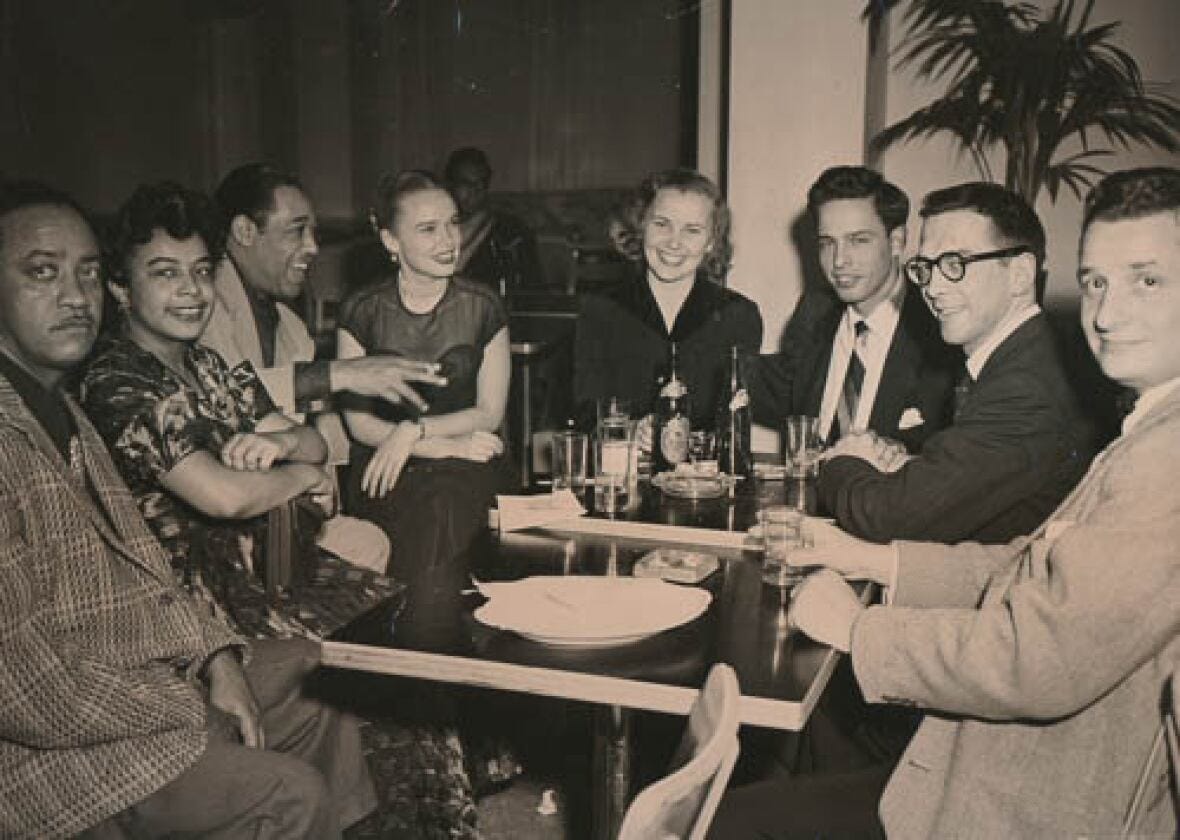In A Mellow Tone, April 24: Duke at 125 — Ellington’s Canadian Connections
Duke Ellington was born 125 years ago this week - we will explore his connections to Canada, including an interview with Canadian jazz composer, Darcy James Argue.
Duke Ellington (April 29, 1899 - May 24, 1974) had and continues to have connections to Canada. In this show we will explore those connections.
The early years
The Duke Ellington Orchestra started visiting Canada for concerts in the early 1930s. We will start the show with an early signature tune for the orchestra, recorded in 1932 - “East St. Louis Toodel-oo”. We will also hear another Ellington tune from that era, “It Don’t Mean a Thing, If It Ain’t Got That Swing” played by Fraser MacPherson, Oliver Jones and Neil Swainson, recorded live at the 1987 annual convention of the Duke Ellington Society in Toronto. That will be followed by an excerpt of an interview Duke did in 1967, where he talked about Canadian fans and how demanding they were.
In the 1930s, Duke lived with Mildred Dixon, who had relatives in Africville, Nova Scotia. I have already explored Duke’s visits to Africville in a show about the history of Africville in music on February 7.
The Stratford Festival Connection
When Duke Ellington and his Orchestra were playing in Stratford, Ontario in the summer of 1956, Duke and Billy Strayhorn visited the Stratford Shakespeare Festival. Soon after, they announced their next project - a suite in tribute to Shakespeare’s works. The suite was to be performed at the following year’s festival. The suite (and album) was called Such Sweet Thunder. The title comes from Act IV scene i of A Midsummer Night’s Dream, where Hippolyta says:
…never did I hear
Such gallant chiding: for, besides the groves,
The skies, the fountains, every region near
Seem’d all one mutual cry: I never heard
So musical a discord, such sweet thunder.
Duke Ellington spoke to CBC in 1957, on his birthday, about composing the suite in just under three weeks.
Douglas Lanier, a professor of English at the University of New Hampshire has written about the suite and in this interview about the suite, said:
…He’s tapping—it’s an interesting exchange of a kind of cultural legitimacy. On the one hand, he’s popularizing Shakespeare by putting it into a popular jazz idiom, but on the other hand, he’s also claiming a kind of classical status for his own art. He’s saying, My art is like Shakespeare’s and it is up to being compared with Shakespeare; it is a kind of artistic vocabulary that is worthy of Shakespearean content. But he also, at the very same time, makes a point of saying, Shakespeare also included African experience in his works, which of course speaks to his celebration of black culture during that time period.
The full interview about Such Sweet Thunder is worth a listen.
On the show, I will play live versions of “Such Sweet Thunder” and “Star Crossed Lovers” from the suite. From the 1957 studio album, I will play “The Telecasters” (a tune that Duke Ellington told the CBC was one of his favourites), and “Half the Fun (aka Lately)”.
Canada’s Centennial and Duke
In 1967, Duke Ellington recorded an album with the Ron Collier Orchestra, as a piano soloist. The album was released in 1968 under the title Duke Ellington in Canada: North of the Border but has also been released under the title Collages.
On the show we will hear “Aurora Borealis” composed by Ron Collier and “Nameless Hour” composed by Neil Symonds.
The album is hard to find and is not available on streaming services, but you can listen to the whole album online.
Ron Collier went on to collaborate with Ellington as an orchestrator (and, uncredited, as co-composer) on Celebration (1972), commissioned by the Jacksonville Symphony Orchestra. Collier also collaborated with Ellington on The River (1970), recorded by Ellington with the Detroit Symphony Orchestra — and occasionally conducted the Ellington orchestra.
Diminuendo In Blue
Duke Ellington originally recorded “Diminuendo in Blue” and “Crescendo in Blue” in 1937. The live recording at the 1956 Newport Jazz Festival is credited with reviving a sagging career. Darcy James Argue, originally from Vancouver, composed a response to “Diminuendo in Blue” for the 2023 album by his Secret Society band, Dynamic Maximum Tension.
In this part of the show, we will hear the original recording of “Diminuendo in Blue” and will also hear Darcy James Argue’s musical response, “Tensile Curves”. I also spoke to him about Duke Ellington’s contribution to jazz composition and we will hear parts of that discussion.
Darcy James Argue’s Secret Society will be making its only Canadian appearance this year at the Ottawa Jazz Festival. He made no commitment to playing “Tensile Curves” (it is a 35 minute composition) but the rest of the album is equally dynamic and it should be an excellent concert.
The Last Remaining Ellingtonian?
Eve Duke was a Washington, D.C., singer who was discovered by Duke Ellington in 1950, and she recorded with him under the name Yvonne Lanauze.
She recorded three tracks with Ellington in 1950: “Love You Madly”, “Sophisticated Lady”, and “Mood Indigo”. I will play “Love You Madly” on the show. Here she is with Duke Ellington and band members (second on the left).
Eve Duke relocated to Canada and played in small venues in Montreal, Ottawa and Toronto before settling down in Vancouver, where she still lives. She was interviewed in 2022 about her life.
Duke Ellington and CKCU
Ron Sweetman, the original host of In A Mellow Tone, chose Duke Ellington’s song “In a Mellotone” as the theme of the show - both in the name but also as the musical theme. We’ve used that song ever since - for 48 years! I will end the show with a version of the same tune, performed by Fraser MacPherson, Oliver Jones, and Neil Swainson at the 1987 Ellington conference in Toronto.
You can listen live at 93.1 FM in Ottawa on April 24 from 9-11 p.m, or online. The show will be available for on demand streaming shortly after broadcast.








